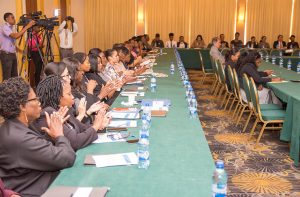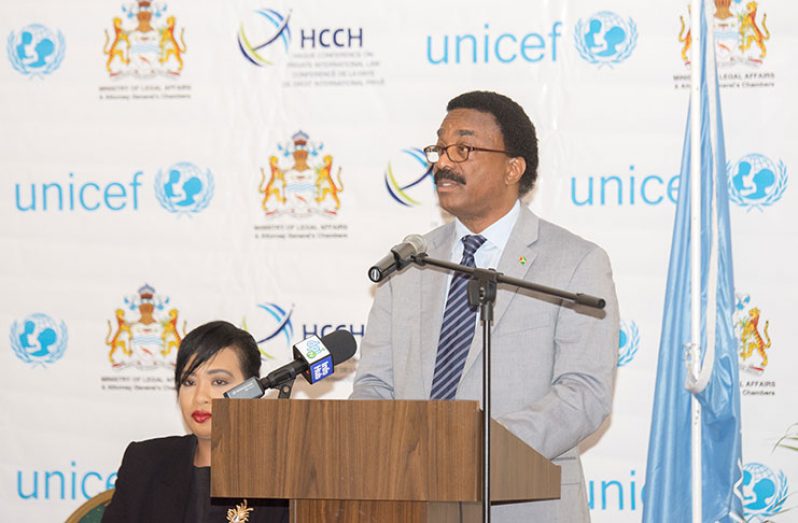By Alexis Rodney
THE Government of Guyana is working towards becoming a signatory to the Apostille Convention; an international treaty which specifies modalities through which a document issued in one signatory country can be certified for legal purposes in another such country.
Attorney General and Minister of Legal Affairs, Basil Williams told the opening session of the second Hague Conference of International and Private Law (HCCH) at the Pegasus hotel on Thursday that the Ministry of Foreign Affairs has already presented the convention to Cabinet and has received its approval.
The Hague Convention Abolishing the Requirement of Legalisation for Foreign Public Documents, is an international certification comparable to a notarisation in domestic law, and normally supplements a local notarisation of the document. It facilitates the circulation of public documents executed in one-State party to the Convention and to be produced in another State party to the Convention. It does so by replacing the cumbersome and often costly formalities of a full legalisation process or chain certification.

This means that the authentication of public documents such as birth, marriage and death certificates, extracts from commercial and other registers; patents; court rulings; notarial acts and attestations of signatures and academic diplomas issued by public institutions can be accomplished swifter, safer and with greater efficiency.
The Convention has proven to be very useful for States that do not require foreign public documents to be legalised or that do not know the concept of legalisation in their domestic law. The citizens in these states enjoy the benefits of the Convention whenever they intend to produce a domestic public document in another State party which, for its part, requires authentication of the document concerned.
The Convention also applies to administrative documents; notarial acts and official certificates which are placed on documents signed by persons in their private capacity such as official certificates recording the registration of a document of the fact that it was in existence on a certain date, and official and notarial authentications of signature.
“The importance of the Apostille Convention would tremendously improve the situation of businesses and the lives of Guyanese within the diaspora who from time to time would send documents back to Guyana,” the AG told the gathering of lawyers and other members of civil society.
He said Guyana becoming a signatory to the convention would enable it to have documents from other countries that are signatories with “a mere application of the document to accept the content of such documents as true.”
Meanwhile, the AG said Government was happy to lead the consultative process of the Hague conference which he said will inform the way forward on how stakeholders could collectively improve the International Human Rights Architecture, especially in the areas of International Family law, business and commerce among others. The conference, he said, has an objective of seeking to improve the everyday life of individual families and businesses, by providing legal frameworks.
“You will agree with me that we are living in an age of globalisation, where problems that confront us can all be solved when we work together to resolve them,” Williams related. The meeting, he said therefore, would be instrumental on paving the way forward, especially as it relates to Guyana’s discretion on which conventions Guyana should prioritise.
He said the government understands the importance of promoting legal corporation and commercial and cross-border trade in the region and around the world. Government also understands that as part of the process, consideration must be given to the Hague Conventions, he said.

“The meeting is important for stakeholders’ views on whether Guyana should become a contracted state as government seeks to improve its national and international architecture that is reflective of international standards (continually) to solving problems for families and business with a special interest on children, child protection and child maintenance as we seek to ensure the best support of families as the most essential institution in the society,” Williams said.
Meanwhile, UNICEF deputy representative Paolo Marchi said the Child rights organisation is much focused on the conventions that affect the lives of children and hoped that the stakeholders would closely consider the acceptance of all conventions including the Adoption, abduction and Child Protections and child support conventions. These he hopes will channel thorough conversations and eventually become enshrined in the country’s laws. He again committed UNICEF’s preparedness to support the country in the eventual process of adopting the Hague conventions.



.jpg)








